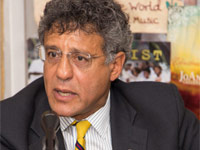WASHINGTON, DC – Minister of State for Labour and Social Development, Loretta Butler-Turner, said the national training and retraining programme implemented by the Government of The Bahamas had been very well received in the hemisphere, and is in fact being touted among the region’s “best practices” by the International Labour Organisation (ILO).
The minister was in DC for a week of meetings, ending with the Inter-American Development Bank (IDB) “Regional Dialogue For Labour Markets And Social Security Policy. At those meetings, she reported on the implementation of an unemployment benefits programme in The Bahamas that saw more than $16.4 million shelled out in its first four months, and a retraining programme with an 80 percent completion rate.
The minister discussed aspects of the government’s labour and social agenda, with special emphasis on programmes and initiatives aimed at ameliorating the worst effects of the financial crisis since mid 2008. That crisis, she said, rocked the three pillars of the Bahamian economy – tourism, financial services and construction – and led to a severe economic downturn.
“The magnitude of the crisis became obvious when we began to see massive lay-offs at large hotel properties and double digit unemployment,” Mrs. Turner said.
“These events were followed by an increasing number of requests for all forms of social assistance.”
Faced with this, the minister said, the government initiated dialogue with its social partners. Some time ago, the government had introduced the Tripartite Forum on Labour (TRIFOR), which brought together representatives from government, the employers’ confederation, unions, The Bahamas Chamber of Commerce and other non-governmental organisations to discuss issues related to labour.
The Bahamas also became a signatory to the protocols of the International Labour Organisation’s Decent Work Country Programme, which aims to deliver ILO support to countries. A key component of the Decent Work Country Programme is to promote decent work as a vital part of national development strategies. They also organise ILO knowledge, instruments, and advocacy for members of Tripartite Forum on Labour.
In The Bahamas, the Decent Work Country Program focuses on Institutional Strengthening of the Department of Labour, making tripartism and social dialogue central to the making of public policies and the strengthening of labour legislation and rights at work. Unemployment Benefit Programme Mrs. Turner said these steps meant that The Bahamas had already taken steps that allowed the government to move swiftly with its social partners, particularly those in Labour and Commerce, to agree on a course of action in response to the economic crisis.
“A significant and landmark initiative was the introduction of the Unemployment Benefit Programme by the National Insurance Board,” the minister reported. “This programme had the full involvement of our social partners before it was implemented as social dialogue is mandated by The Decent Work Agenda of the I.L.O.”
In April, 2009, the National Insurance Board (NIB) introduced the interim phase of the Unemployment Benefit Programme. During the initial phase, the NIB recognised the prevailing economic conditions and their impact on the unemployment levels in The Bahamas, and so instituted liberal eligibility conditions.
“The intent was to help ease the financial burden of as many unemployed workers as possible,” Mrs. Turner said. “During this first month [April 2009] 5,010 claims were awarded, valued at $8,103,233.00, with the average weekly benefit being $134.”
“By the end of the four months – between April and July 2009 – just over 10,000 claims had been awarded at a cost of $16,409,703.00.”
The programme was implemented throughout The Bahamas. The minister pointed out that one of the main stipulations for receiving the Unemployment Benefits is that the applicant must first register with the Employment Exchange of the Department of Labour. This exchange connects potential employees with employers, which speeds up the process of getting a new job, and shortens the time unemployment benefits may be necessary.
Mrs. Turner also stressed some of the more particular guidelines of the Unemployment Benefit Programme: applicants cannot reapply for unemployment assistance for one year after they have received their last cheque, and will need to have worked at least five months before again becoming eligible.
The permanent phase of the Unemployment Benefits Programme required an adjustment in contributions, and so, on June 1, 2010 – for the first time in the 35-year existence of the National Insurance programme – the rate of contributions were increased by one percent – one half percent to be paid by the employer, and the other half percent to be paid by the employee.
“This translated to a maximum weekly increase of $2 for the employer and $2 for the employee; though relatively slight, this increase represented a further strengthening of our social security safety net,” Mrs. Turner said.
She reported that in the permanent phase, a claimant must have paid at least 52 contributions to National Insurance in his work life. In addition, he must have paid and/or been credited with 13 contributions in the 26 weeks immediately before the week unemployment benefits are to begin. The benefit is paid at a rate of 50% of the average insurable income for up to 13 weeks. The maximum that can be paid is $500 every two weeks.
“While the goal of the Unemployment Benefit Programme is to assist the unemployed, it is structured in such a way as to avoid over-dependence,” Mrs. Turner explained. “Although the programme is still in its infancy, it is fully incorporated and legislated as a part of our National Insurance programme.”
National Training Programme The Bahamas government’s second major response to the financial crisis was the creation of a National Training Programme administered by the Ministry of Labour and Social Development in conjunction with The Bahamas Technical and Vocational Institute, and the College of The Bahamas.
In July 2009, the government allocated $250,000 to the Department of Labour for the programme, which was primarily aimed at hotel workers who had been recently terminated.
“I am pleased to report that over 700 people enrolled and there was an 80% completion rate. Participants had the opportunity to receive training at the Bahamas Technical and Vocational Institute and The College of The Bahamas in a number of areas including Accounting, Tiling, Plumbing, Electronics, Welding and Small Engine Repair. These were identified by the Department of Labour as the skills most likely to be needed in the labour market in the near future.”
Eighty-five Graduates of The National Training Programme went on to participate in an Entrepreneurial Programme. Based on the production of business plans which were reviewed by a panel, 42 participants were awarded a small grant to start a small businesses venture, many of whom are now engaged in the production of craft items made from indigenous products.
“The Commonwealth of The Bahamas suffered many of the same effects of the financial crisis as did other member states of this assembly,” Mrs. Turner said. “The government seized the opportunity, in collaboration with its social partners, to implement initiatives to mitigate the negative impact of the crisis.”
By K. Quincy Parker
Press Attaché Embassy of The Bahamas



